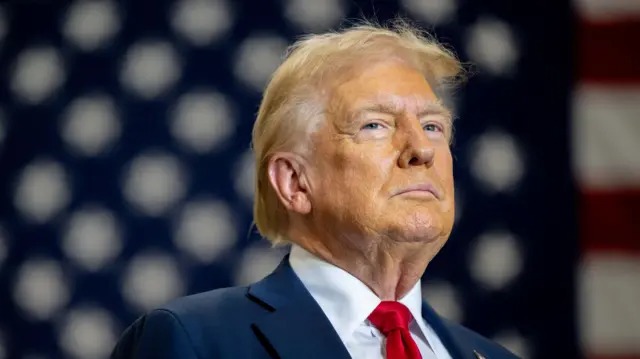US President-elect Donald Trump’s decision to gradually raise tariffs once he takes office would be «problematic» for the Federal Reserve as it battles the last mile of inflation, according to UBS AG’s Arend Kapteyn.
“We think of tariffs as a one-time change in the price level that then disappears a year later, and then as long as they are not large enough, there are no spillover effects, so there are no second-round effects that are a kind of inflation.” “Kapteyn, global head of economic and strategic research at UBS, said in a television interview with Stephen Engle in Shanghai on Tuesday.
“But if you apply rolling tariffs, it’s a bit like a repeat of the pandemic and the Ukraine shock that we had, you have supply shock after supply shock and you start to create a much higher spike in inflation, so I think it’s much more difficult. We more or less know what to do with that as a central bank,” he said.
His comments come after Bloomberg reported, citing unnamed officials, that members of Trump’s incoming economic team are discussing a gradual increase in tariffs month by month, an approach aimed at increasing negotiating leverage while also help avoid a rise in inflation.
Kapteyn said he did not believe financial markets were factoring in the risk of higher U.S. tariffs.
“We believe it is inflationary,” he said. “And then, of course, it becomes a tariff question of who, how much and what is exempt,” he added.
“If general tariffs are applied, it is much more inflationary than if things for which there is no alternative begin to be exempted.”
Investors now eagerly await US inflation data on Wednesday, which is likely to show core prices cooled only slightly at the end of 2024. This will potentially support a slowdown approach by the Federal Reserve after cutting rates three times last year. The money market forecasts only a reduction in 2025.
U.S. inflation data increasingly suggests that progress toward more moderate prices has essentially stalled at a time when the labor market and demand show few signs of strain. Trump’s return to the White House increases uncertainty about the outlook for global growth and inflation.
Goldman Sachs Group Inc. predicts core U.S. inflation of around 2%, very close to the Federal Reserve’s target, chief economist Jan Hatzius told Bloomberg’s Minmin Low in a television interview in Hong Kong.
“In that kind of environment, I still think a couple of cuts are likely to be made,” he said Tuesday. “But clearly the FOMC is in no rush and that’s why we think it will be necessary later in the second quarter, probably at the June meeting, for the first cut to be delivered.”
However, if inflation proves stiffer and remains near 3% throughout the year, then the Federal Reserve may not make any cuts, he added.
Hatzius said U.S. tariffs are unlikely to have a “huge impact” on inflation and growth.
Fountain: https://www.bloomberg.com/news/articles/2025-01-13/rolling-us-tariffs-would-be-problematic-for-fed-ubs-says?cmpid=BBD011 425_TRADE&utm_medium=email&utm_source=newsletter&utm_term=250114&utm_campaign=trade&sref=DPtqrPAJ&embedded-checkout=true





